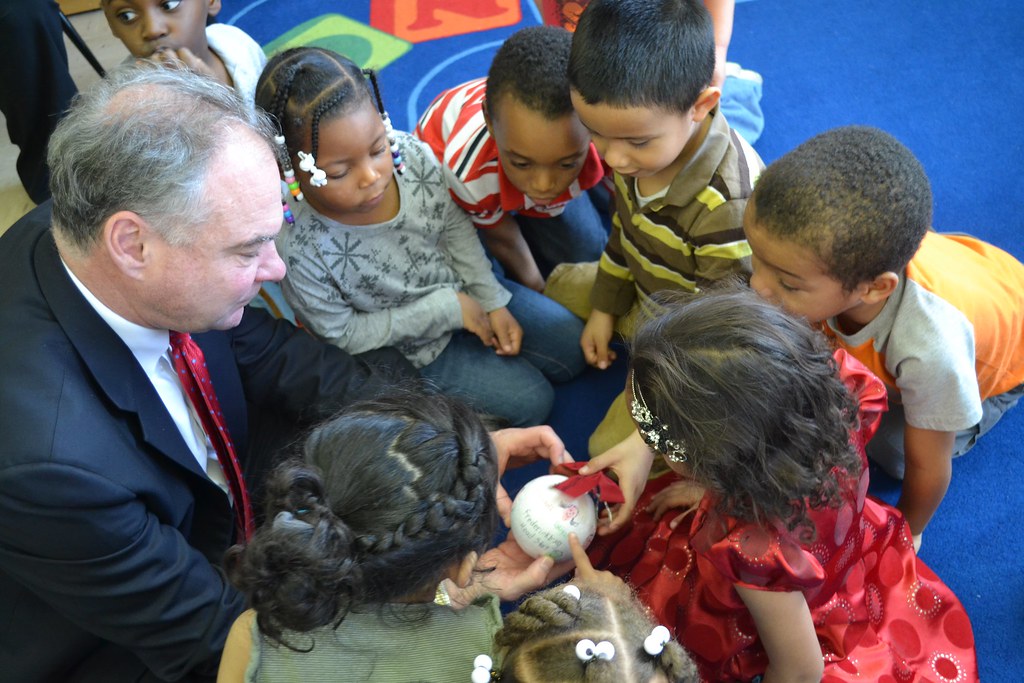Tim Kaine on Education

Virginia’s innovative investments in education – from pre-kindergarten to post-graduate and workforce training – have turned our state into a magnet for talent. Talented people generate creative ideas for companies and jobs, and great businesses locate in places where they know they can hire capable workers. In order to return America to the top in the world in educating our population, we have to look at reforms like broadening our early childhood education system, creating more rigorous K-12 curriculums, renewing our focus on career and technical education and dramatically reducing the cost of college.
As Governor, I invested in every aspect of Virginia’s education system. I worked with the legislature to expand the number of children enrolled in Pre-K by nearly 40 percent. I also championed a successful $2 billion higher-education construction bond package that built facilities colleges and universities across Virginia need to attract the best students and faculty. This ongoing commitment to expanding and improving education opportunities paid off: In 2007 Education Week ranked Virginia the state where a child was most likely to have a successful life.
I brought my passion for education to the Senate, where I co-founded the bipartisan Career and Technical Education (CTE) Caucus. From working in my dad’s ironworking and welding shop to teaching at a technical school in Honduras, I’ve always been a strong believer in the importance of high-quality CTE programs. . As co-chair of the CTE Caucus, I’ve introduced bipartisan legislation like the Educating Tomorrow's Workforce Act to raise the quality of CTE programs at schools in Virginia and across the country. This bill improves the Carl D. Perkins Career and Technical Education Act to better meet the needs of a 21st century workforce and ensure students have access to the highest-quality CTE programs. I’ve also led efforts to include CTE in the Elementary and Secondary Education Act by including career and technical programs in the definition of ‘well-rounded education’ alongside math or science, supporting professional development for CTE teachers, and strengthening career counseling in schools.
I’ve long been concerned about the prevalence of sexual assault and data showing that young women between the ages of sixteen and twenty-four consistently experience the highest rate of intimate partner violence. In December, I met with students involved in One Less at the University of Virginia, a group of advocates for survivors of rape and sexual assault, to hear their opinions on what more can be done to prevent sexual violence on college campuses and support survivors. Some of the students I spoke with said they were never taught about sexual assault before college orientation, and they believed incorporating information into secondary school curriculums could help educate students about dating violence prevention and what constitutes consent. Following this discussion, I went to work on crafting the Teach Safe Relationships Act, legislation that encourages schools to teach students about safe relationship behavior as a tool for preventing sexual assault on and off our college campuses.
I’m pleased to report that Congress passed a bipartisan education reform bill in December 2015 called the Every Student Succeeds Act (ESSA). This bill replaces the long-expired and broken legislation known as No Child Left Behind. It will make changes that educators and families support, like decreasing the emphasis on standardized testing and giving states the flexibility to close achievement gaps. I’m also pleased that the bill will allow elementary and secondary schools – for the first time – to use Title IV funds for instruction and training on safe relationship behavior among students. I authored this provision because I believe it will help prevent sexual assault, not just on college campuses, but for all young people in the 16-24 age range who are most vulnerable. Additionally, ESSA includes my provisions to improve access to K-12 career and technical education (CTE) programs.
From early learning to postsecondary education, I believe education is key to growing a talented workforce. As Senator, I introduced the Strong Start for America’s Children Act, legislation to expand access to high-quality early learning programs for children from birth to age five. As a parent, I’ve seen firsthand the positive impact that pre-K can have on our children. I also understand the importance of a quality higher education at an affordable cost. That’s why I co-sponsored the Supporting College Access and Success Through Dual Enrollment Act, legislation to help students earn college credits in high school in order to cut the cost of earning a college diploma. I also co-sponsored The Net Price Calculator Improvement Act of 2014, bipartisan legislation to give students and families a better estimate of college costs before they apply to schools. I also successfully urged the U.S. Department of Education to allow students to apply for federal student aid earlier in the college application timeline and allow them to use prior year tax data to expedite the approval process so students have a better sense before they apply or get accepted into a college how much financial aid they will receive.
We must address access to quality, affordable education if we want to remain the most competitive workforce in the world.Issue | Issues | Tim Kaine | U.S. Senator for Virginia:
